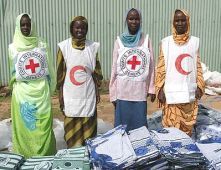Red Cross begins airlifting food aid to Darfur refugees
KHARTOUM, Sudan, June 4, 2005 (AP) — The Red Cross said Saturday it had begun airlifting food supplies to refugees in the violence-wracked Darfur region, saying a rising number of attacks on aid convoys made it too risky to move the food by road.
 |
|
Aid workers from the ICRC and Sudanese Red Crescent distribute blankets to Sudanese refugees in Sudan’s Darfur. In an effort to prevent further migration to the camps, the ICRC has also extended its assistance to residents of rural areas and is distributing tools and seeds for the next farming season (May – July 2005). In addition to food assistance, the ICRC has also provided essential household goods such as blankets, kitchen utensils and soap to around 350,000 people in more than 25 locations across the region. (ICRC) . |
Paul Conneally, spokesman for the International Committee of the Red Cross, said a chartered Russian plane had left Khartoum early Saturday carrying the first shipment of a planned 4,000 tons (metric tons) of food aid. The Red Cross plans to operate 12 flights a week for the next two months to Nyala and El-Fasher, Darfur’s main centers.
From there, the supplies of sorghum, lentils and cooking oil will be trucked into rural Darfur where whole communities are in need of humanitarian assistance, the Red Cross said.
In a statement, the Red Cross said the airlift had been prompted by dwindling food supplies and the growing number of people dependent on food aid.
“This situation is underscored by increasing insecurity on the roads from Khartoum to Darfur where attacks on aid convoys are on the increase,” the group said.
The group also said the approaching rainy season would hamper the delivery of food overland.
The Red Cross said the US$2.2 million (A?1.79 million) project could be extended for an additional month if necessary.
The crisis in Darfur erupted when rebels took up arms against what they saw as years of state neglect and discrimination against Sudanese of African origin. The government is accused of responding with a counterinsurgency campaign in which ethnic Arab militia known as Janjaweed committed wide-scale abuses against ethnic Africans. At least 180,000 people have died, many from hunger and disease, and about 2 million have fled their homes.
